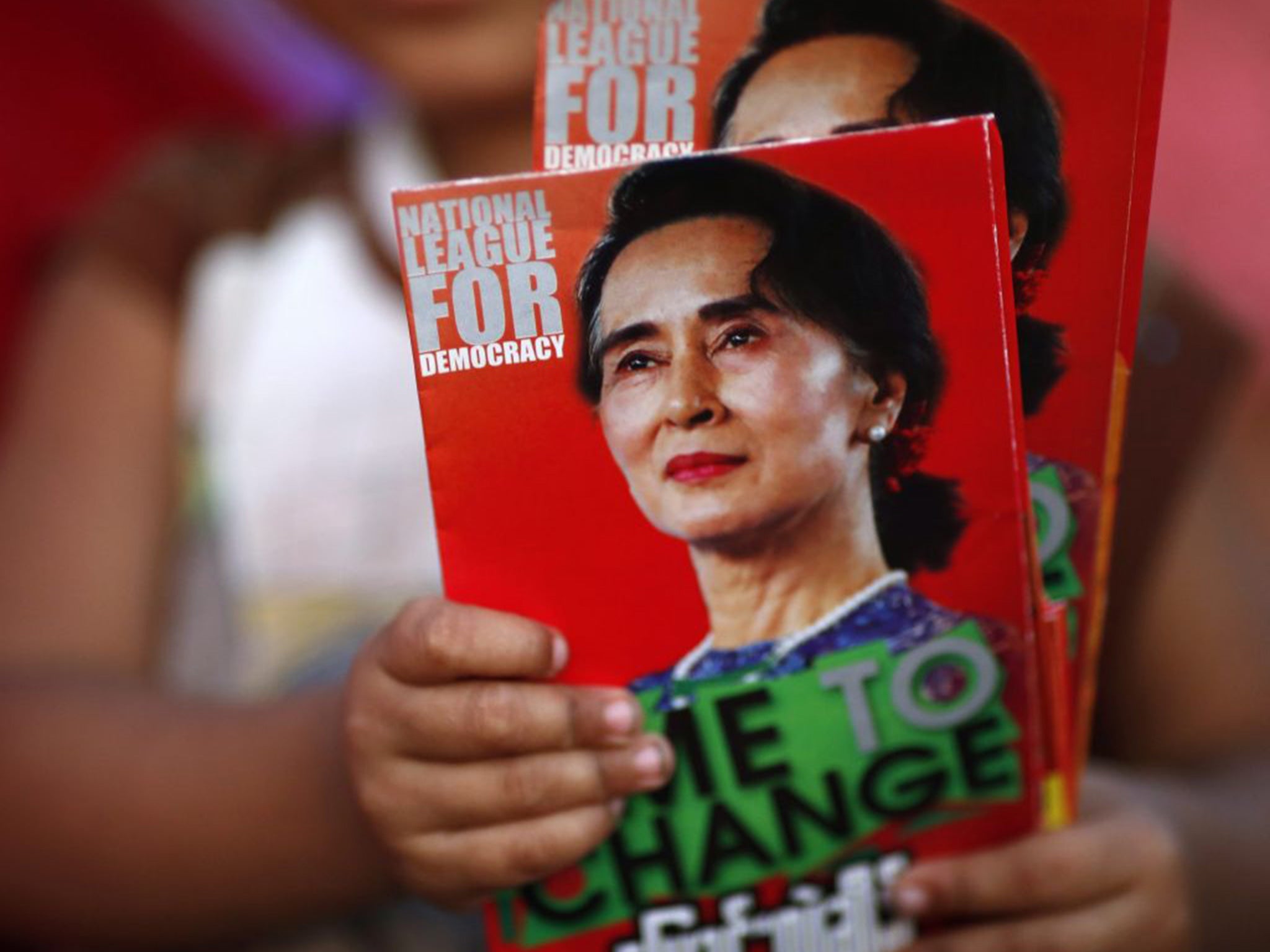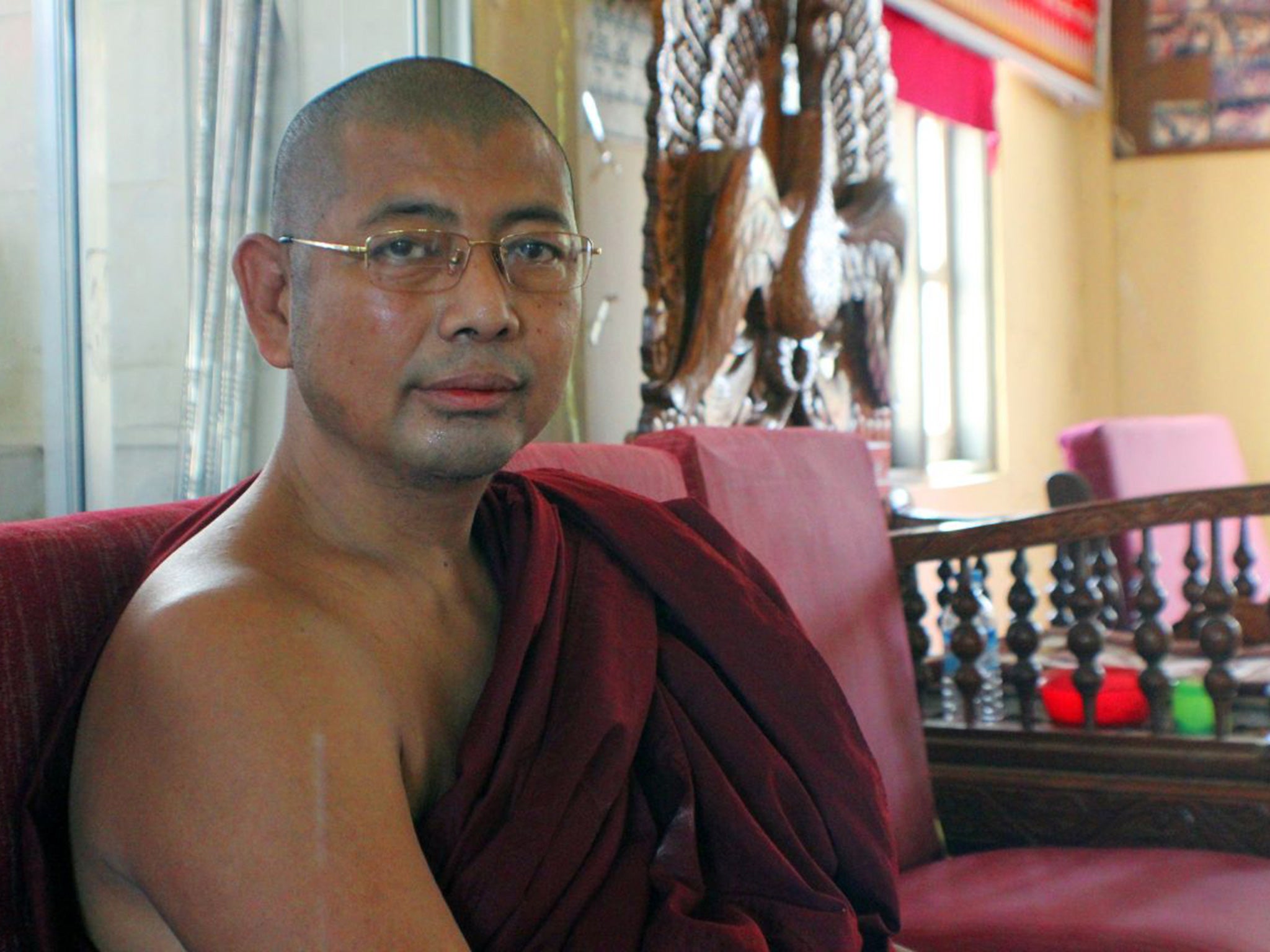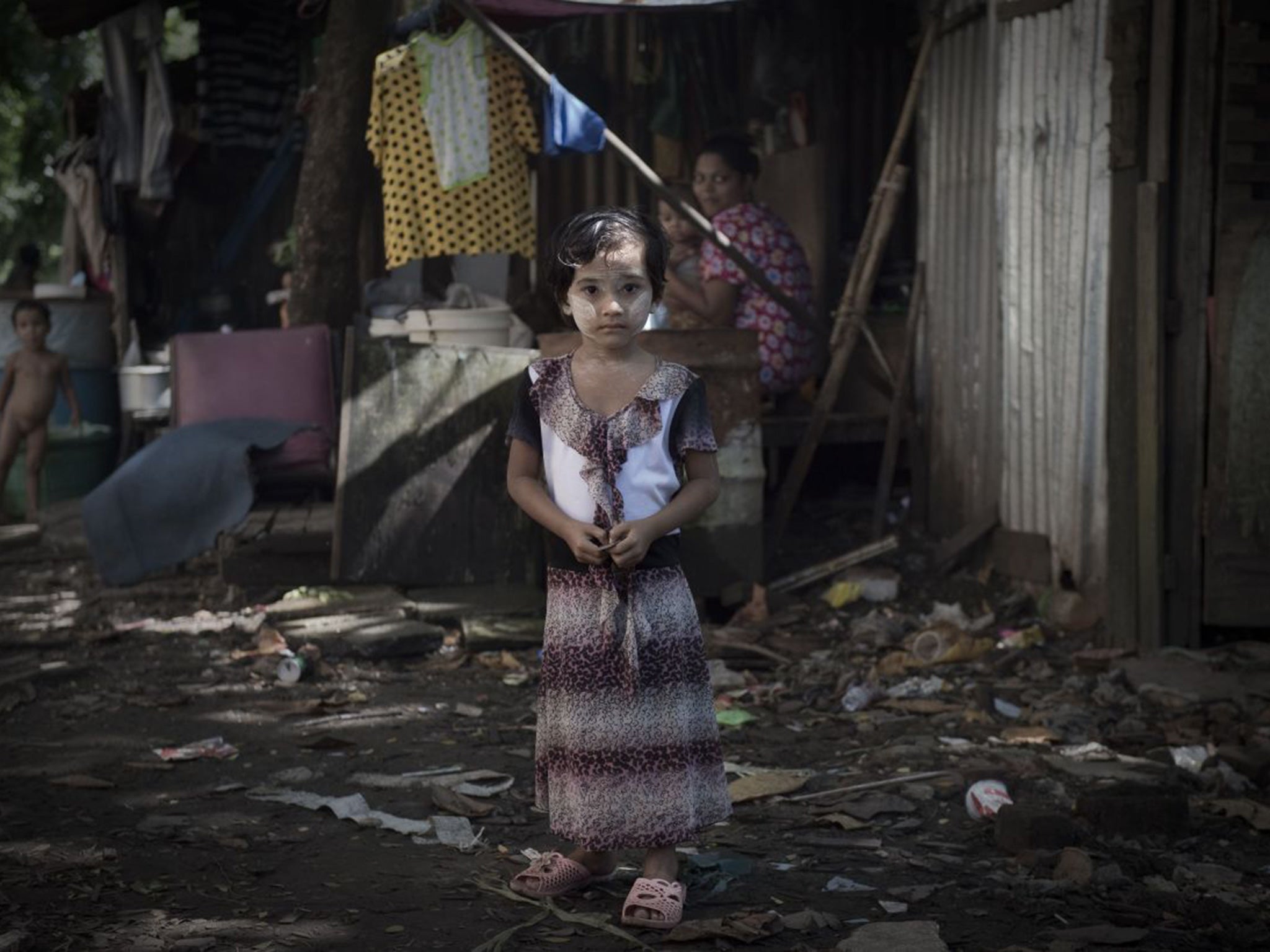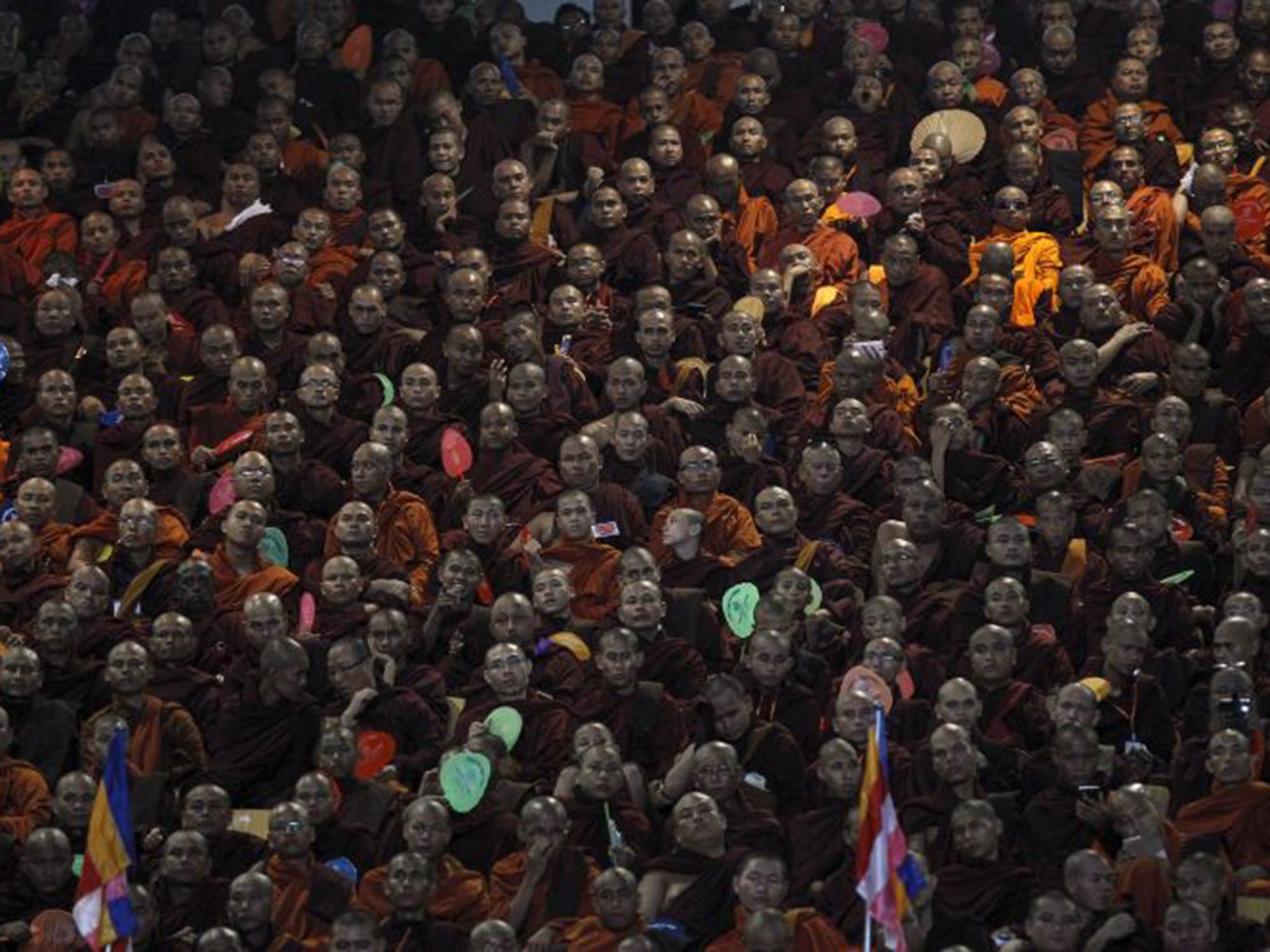Burma elections: Buddhist monks warm to military in face of perceived Muslim threat
President Thein Sein and his colleagues are playing the Buddhist card, gambling that it can tilt the balance their way

Your support helps us to tell the story
From reproductive rights to climate change to Big Tech, The Independent is on the ground when the story is developing. Whether it's investigating the financials of Elon Musk's pro-Trump PAC or producing our latest documentary, 'The A Word', which shines a light on the American women fighting for reproductive rights, we know how important it is to parse out the facts from the messaging.
At such a critical moment in US history, we need reporters on the ground. Your donation allows us to keep sending journalists to speak to both sides of the story.
The Independent is trusted by Americans across the entire political spectrum. And unlike many other quality news outlets, we choose not to lock Americans out of our reporting and analysis with paywalls. We believe quality journalism should be available to everyone, paid for by those who can afford it.
Your support makes all the difference.Abbot U Par Mount Kha, 52, sits on his peacock throne upstairs in his monastery outside Rangoon and lays it on the line.
A leader of the Saffron Revolution in 2007, a friend of Aung San Suu Kyi – a crudely painted portrait of the two of them hangs in this hall – and a long-time supporter of her National League for Democracy, today he has a very different message.
“Buddhism in Burma today is weak,” he says. “We face pressure from the Islamic religion.” He reels off the names of Rangoon districts where Muslims are a significant fraction of the population.
I point out that Muslims have lived in Rangoon for at least 150 years, the two communities co-exist without apparent stress, and the city has escaped the wave of attacks – mostly Buddhist on Muslim – that have occurred elsewhere in the past four years. Muslims in Burma constitute around 5 per cent of the population, as against the 90 per cent plus of Buddhists. Where exactly is the threat?
“That is a superficial view,” he says. “You don’t see the inside situation. Islam’s way of domination in Burma is through marrying Buddhist Burmese women. They each take four wives, each of the wives has seven children, and they are all forced to become Muslims.” This has happened before all over South- East Asia, he argues. “Malaysia and Indonesia used to be Buddhist countries, now they are Islamic states.”

The Abbot’s message – amplified around the country by the Association to Protect Race and Religion, known as Ma Ba Tha – is the most incendiary and unpredictable element in the Burmese general election.
A long time ago there were no divisions. Buddhists and Muslims lived together and struggled for independence under one flag
Much the worst flashpoint between Buddhists and Muslims is Arakan state, where communal violence first broke out in May 2012 and flared up again later in the year, forcing more than 100,000 Rohingya Muslims to flee their homes. The great majority are still housed in squalid camps. The government subsequently cancelled their identification cards, so for the first time since independence, the Rohingya are barred from voting.
But Arakan is highly exceptional. It has a long and porous border with Bangladesh. The rough demographic equivalence of Buddhist and Muslim communities today – in parts of northern Arakan bordering Bangladesh Muslims constitute more than 90 per cent of the population, and in the capital, Sittwe, the communities were roughly equal in size before it was ethnically cleansed – is at the root of the hostility.
Friction between the two communities has often provoked violence in the past. What changed after 2010 was the return of democracy: suddenly their relative size had a direct bearing on politics. It was the reported rape of a Buddhist woman by two Muslims that set off the first wave of burning and killing, but it was a pogrom waiting to happen.

But Arakan’s problems have no equivalent in the rest of the country, where Muslim shopkeepers and traders are thinly scattered through the large towns and cities. They use Burmese names, their mother tongue is Burmese and until recently they played a full part in the nation’s life.
“A long time ago there were no divisions,” said San Tin Kyaw, a Muslim running for election in central Rangoon. “Buddhists and Muslims lived together and struggled for independence under one flag.” But the paranoid nationalism of successive Burmese rulers, starting with General Ne Win, has slowly eroded their position: children today learn only about Buddhism, not other religions, and increasingly Muslims found it harder to move around the country and get decent jobs.
But these problems are as nothing next to the events of the past four years, which have culminated in new laws strictly regulating marriage between Buddhist women and non-Buddhists and – in a move prompted by the belief that Muslims have too many children – requiring women in congested areas to space their births.
The surge of Buddhist nationalism has driven Suu Kyi into a corner. The commitment of the Nobel Peace Prize-winner to human rights is unquestioned. But with well-placed Muslims among the founders and members of her party, while the vast majority of her devoted supporters in the country are pious Buddhists, she has struggled to steer a course that would satisfy either side, let alone her supporters in the West.

Asked last week about the plight of the Rohingya, Suu Kyi said: “We should not exaggerate the problems in this country…. Remember the Burmese saying, you have to make big problems small and small problems disappear.” It was hardly good enough.
At the same press conference she attacked Ma Ba Tha for abusing the constitution by bringing religion into politics. But now they have brought it in, it is hard for her to force it out again.
Ingrid Jordt, a former Buddhist nun in Burma, now an anthropologist in the US, says the tight relationship between monks and rulers “goes back 800 years”. Traditionally, she said, “the monks’ role was to admonish the king, and the king’s role was to purify the sangha”, as the community of monks is called.
Burmese Buddhists, says Jordt, “feel that their religion is historically under threat…. I have heard monks talk about military rule and how dictatorship is actually good for the religion. Under military rule, people only spend their time doing religious works rather than watching movies or shopping. Part of the shared collective idea between military and laity and monks is the notion that preserving the religion is of paramount concern for the people.”
These are the emotions that U Par Mount Kha and others are tapping into. There is no doubt that their ever bolder verbal attacks on Islam are underwritten by generous donations from the military: after 50 years of tyrannising their compatriots, the military is deeply unpopular, and its political proxy, the ruling party, has the incumbency factor from hell. President Thein Sein and his colleagues are playing the Buddhist card, gambling that it can tilt the balance their way.
Can these rabble-rousing monks make a difference – driving voters en masse away from the NLD into the arms of the military’s proxy? That is the election’s great unknown.
Join our commenting forum
Join thought-provoking conversations, follow other Independent readers and see their replies
Comments